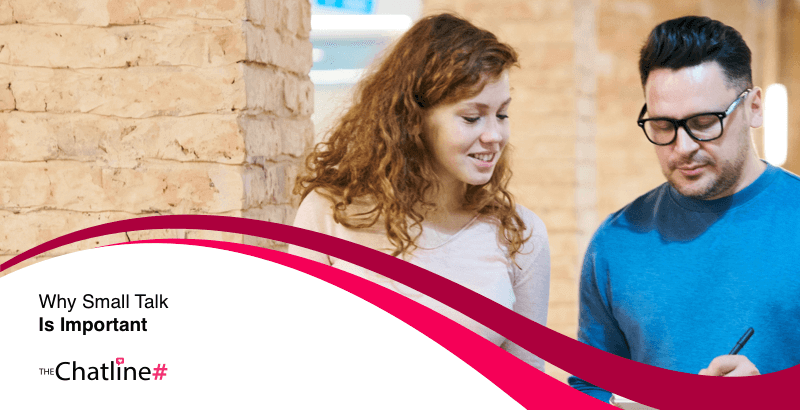Imagine yourself at a social event or party where everyone is having a nice conversation with someone. As you approach the bar to get something to drink, you find yourself standing next to another person you don’t know. This person is obviously all alone, just like you. You are certain that you want to talk, but you don’t have the slightest idea what to say.
In one way or another, we have all been in this situation before. However, the awkward silence can be quite embarrassing and uncomfortable. Your lack of initiative can potentially give rise to a bad impression or even a misunderstanding.
This is where small talk becomes fundamental and relevant.
There will always be instances where you need to initiate an informal conversation with another person to express courtesy. Small talks are not just polite gestures; they are also friendly actions that acknowledge a person’s presence. It could be as simple as saying “hi”, or a bit more spontaneous, like exchanging a couple of statements before parting ways.
If you want to learn the art of small talk and come up with clever ideas on how to initiate one, you can refer to this ultimate guide on small talking at any time. Keep in mind that initiating small talk takes more than just courage and self-confidence. Your sheer sincerity, politeness, and charm are contributing factors that can spell your success when initiating small talk.
What Is Small Talk?

Small talk is a polite and informal conversation between individuals who may not want to engage in deep or complex topics. Small talk refers to short and sometimes mindless conversations that fill up awkward silences. These are the momentary chats that we share with random people and the spontaneous exchange of words that happen in most chance encounters.
In social gatherings and public places, small talks are usually initiated as an act of courtesy or to feel comfortable around strangers. A well-executed small talk can break the ice and lead to a more engaging conversation. For example:
- Dropping a funny line or a clever question to grab someone’s attention at the bar.
- Saying “hi” to the person sitting next to you on the train.
- Mentioning something about the weather to your favorite barista.
- Complementing your neighbor’s garden as you pass by.
The universal characteristic of small talks is that they have nothing to do with specific transactions, and they can last only for a brief moment. So, if you find yourself talking informally to another person, whether to break the silence or as an act of courtesy, consider it as a form of small talk.
Why Small Talk Is Important

Small talk is important because it is a sign of courtesy and regard towards another person, whether it’s a stranger or someone you know. It is also a way of acknowledging the people around you. Imagine passing by familiar faces every day without even acknowledging their presence – wouldn’t that be quite rude?
Just the same, it’s quite awkward to ignore someone who’s standing right next to you at a party, someone who is looking eager to engage in conversation. Furthermore, pretending that the people around you don’t exist is not a healthy attitude.
Others can easily get the impression that you are exhibiting anti-social behavior or lack of interest in making new friends and acquaintances. Hence, you’re distancing yourself by ignoring everyone.
Small talks, regardless of how trivial they are, create multiple opportunities for new connections to develop. They can bridge the gap between awkwardness and understanding between people.
Whether it’s greeting the person who delivers your newspaper every morning or saying “how are you?” to the guy who opens your office door every single day, such swift encounters can bring a smile to people’s faces and make them feel important.
Small Talk Examples

Small talks are part of our everyday lives. You don’t have to be an excellent conversationalist to acknowledge other people. In fact, small talks are meant to be laid back and relaxed enough to start and end swiftly.
However, small talk can sometimes lead to a more friendly conversation depending on the timing, situation, impact, and chemistry between the individuals involved.
Let’s explore some examples of small talk to understand how it works and its relevance in enabling people to establish rapport and positive connections;
1. Spontaneous Small Talks.
Spontaneous small talks are standard everyday lines that we often say to random people that we meet along the way. They can either be in the form of a greeting or a general statement. Such small talks happen in a spur-of-the-moment, such as saying;
- Excuse me, is this seat taken?
- Hi, nice weather, isn’t it?
- Good morning, how’s it going?
- Great party, huh?
- It was nice seeing you today, but I have to run for work.
These examples of small talks are usually informal and unstructured. We initiate them to express our consideration towards others and to practice good manners. For some, dropping informal lines is a way to initiate a brief conversation.
Spontaneous small talks can happen in public places, workplaces, public transport, social events, and many other settings. They can occur between strangers, acquaintances, or even friends.
2. Casual Small Talks.
Casual small talks are generally communication starters or loose introductions. They can happen at parties, social gatherings, or even in random places. A person would typically drop a few lines to initiate the communication, and how far it will go depends entirely on how the other person responds.
The most typical example of a casual small talk is when you’re trying to get someone’s attention or making an attempt to introduce yourself to a person of interest. It could be greeting your crush and giving her a subtle compliment, approaching an attractive woman at a party to introduce yourself, or saying “hi” to a potential client as a segue to give your business card.
Casual small talks are meant to be spontaneous, light, and natural. Therefore, there is no need to open up any topic for discussion since your objective is mainly to warm up to that person. They can either lead to a more substantial conversation or quickly fizzle out after a few exchanges.
3. Courteous Small Talks.
Courteous small talks are polite gestures that are meant to make people smile. They can be in the form of a compliment, gracious remark, or friendly question.
Some basic examples include:
- Patting a stranger’s dog and asking for its name.
- Complementing another person’s new car.
- Inquiring how your neighbor maintains their beautiful garden.
- Offering to help someone carry their huge bags of groceries.
Courteous small talks are informal yet respectful. The main purpose of such small talk is to recognize people and make them feel valued, without any particular goal in mind. They are meant to bring a smile to people’s faces or uplift their mood by simply giving them a bit of your time and attention.
4. Flirtatious Small Talks.
Small talks may be unimportant and invisible, but they can be the perfect opportunity to flirt with someone or grab a few seconds of their attention. Flirtatious small talks could be as fleeting as saying:
- Hello.
- I’m so glad to run into you.
- Nice to see you here.
However, delivering these short lines with playful charm, making eye contact, or including a compliment can add more meaning to them. Sometimes, one word is all it takes to catch the eye of someone you like.
Some scenarios that can put a flirtatious small talk into good use are unintentionally running into your crush in the hallway, getting on the elevator with a cute guy, or seeing your hot gym buddy at the club.
Flirtatious small talks can be a subtle way to gauge someone’s interest from a person you like. They are not just modest excuses to grab a bit of attention but can allow you to weigh your chances and find out if there is a possibility for something more.
5. Motivational Small Talks.
A motivational small talk is a simple yet powerful gesture that can help ease someone’s anxiety or worry. Offering reassuring words like:
- You can do it.
- Good luck.
- Don’t worry too much.
Can go a long way in making someone feel better.
These small talks often become a part of our regular routine when we share them with random people we meet along the way. Whether we are talking to familiar faces or strangers, saying something positive can make a significant difference in someone’s day.
For instance, wishing your colleague good luck on their presentation, telling your sibling to “break a leg” before their job interview, or telling someone on your daily commute that “things will work out fine” are all great examples of how you can deliver motivational small talks.
The beauty of a motivational small talk is that it doesn’t matter how it’s delivered or how quickly it ends. Expressing how much you’re “keeping your fingers crossed” and “hoping for the best” for another person is a simple yet powerful way to show your support and kindness.
Small Talk Topics

Small talks are typically brief yet amiable conversations. They can happen spontaneously in our day-to-day interactions, allowing us to talk about anything and everything. The key to initiating small talk is to keep it light, enjoyable, and unobtrusive. Stick to inoffensive and respectable topics that don’t require too much thought.
Here are some of the most frequent examples of small talk topics:
1. Comment on the Weather.
While it may be a bit cliché, commenting about the weather is a classic and polite way to initiate small talk. Acknowledging a familiar face as you say, “What a beautiful sunny day, isn’t it?” or “It’s quite chilly out today, isn’t it?” can be a good way to initiate a small talk without being pushy or disrespectful.
2. Compliment the Obvious.
One effective way to start a small talk is by complimenting something that is obvious and positive in the situation. For example, you can comment on how great the party is, how refreshing the view is, how brilliant the ideas are, or how successful the event is. Focusing on the positive and the obvious can help create a comfortable and friendly atmosphere, whether you’re talking to a friend or a stranger.
3. Ask Trivial Questions.
Asking a significant or meaningless question can be a great way to grab someone’s attention and initiate a small talk. For instance, asking questions like “Are you alone or you are alone?”, “Merlot, pinot noir, or cabernet sauvignon?” or “Are you a Facebook-type of person or an Instagram-type?” are all great examples of questions that have no right or wrong answer and can lead to a casual conversation.
4. Discuss Time.
Talking about time can be a great small talk topic. You can mention that the bus is running behind schedule, or that you overslept and missed the train. Other time-related topics include rush hour traffic, daily commutes, waiting times, bus schedules, and your average travel time daily. These are topics that many people can relate to and can easily lead to a friendly conversation.
5. Talk About Current Events.
The daily news and current events are typical topics for small talk. These could include politics, sports, who’s dating whom, and upcoming social events. It is common for people to discuss the latest news and dig into the juicy details, whether at work or elsewhere. Even strangers can engage in small talk about these topics in beauty salons, barbershops, nail spas, and other public places.
6. Ask for Places and Directions.
Inquiring about the best shops, cafes, and restaurants in town and asking for directions on how to get there are good topics for small talk. Whether you’re new in town or simply want to engage in small talk, discussing places and directions is a practical way to socialize and interact casually. You also have the bonus of potentially making new acquaintances.
In conclusion, small talk is a form of shallow conversation that often happens unwittingly or by chance. The more you practice the art of small talk with random people, the easier it becomes. Engaging in small talk is a healthy way to improve your communication skills, confidence, and social graces. It is also one of the best ways to extend a kind gesture to strangers and familiar faces that you cross paths with every day.
Lastly, small talk can significantly improve your character. As long as you do it right, it can be one of the most effective ways to leave a good and lasting impression. After all, it doesn’t take a lot of effort to smile and say “good morning” to a person you come face-to-face with at work or on your daily commute. A kind gesture and small talk can significantly brighten up one’s day and make a huge difference, even without you knowing it.

